一般现在时和现在进行时时态练习及讲解
一般现在时与现在进行时的区别和练习
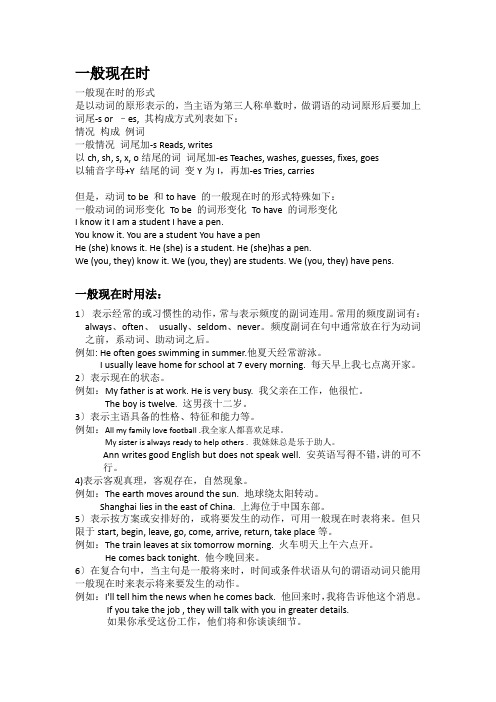
一般现在时一般现在时的形式是以动词的原形表示的,当主语为第三人称单数时,做谓语的动词原形后要加上词尾-s or –es, 其构成方式列表如下:情况构成例词一般情况词尾加-s Reads, writes以ch, sh, s, x, o结尾的词词尾加-es Teaches, washes, guesses, fixes, goes以辅音字母+Y 结尾的词变Y为I,再加-es Tries, carries但是,动词to be 和to have 的一般现在时的形式特殊如下:一般动词的词形变化To be 的词形变化To have 的词形变化I know it I am a student I have a pen.You know it. You are a student You have a penHe (she) knows it. He (she) is a student. He (she)has a pen.We (you, they) know it. We (you, they) are students. We (you, they) have pens.一般现在时用法:1〕表示经常的或习惯性的动作,常与表示频度的副词连用。
常用的频度副词有:always、often、usually、seldom、never。
频度副词在句中通常放在行为动词之前,系动词、助动词之后。
例如: He often goes swimming in summer.他夏天经常游泳。
I usually leave home for school at 7 every morning. 每天早上我七点离开家。
2〕表示现在的状态。
例如:My father is at work. He is very busy. 我父亲在工作,他很忙。
The boy is twelve. 这男孩十二岁。
3〕表示主语具备的性格、特征和能力等。
一般现在时,现在进行时,一般过去时讲解
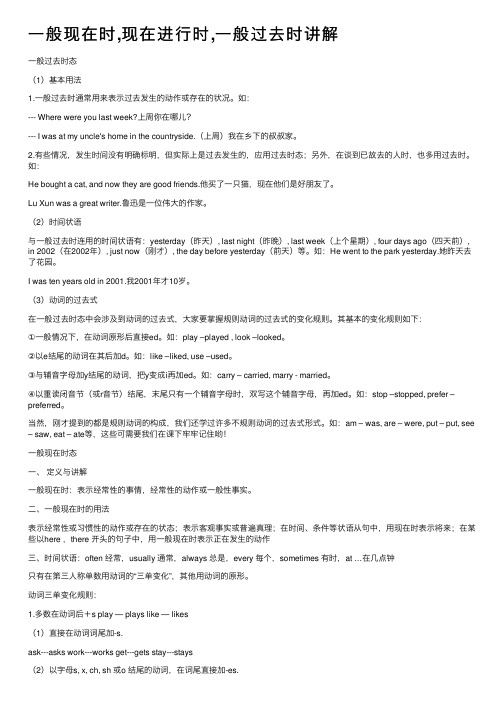
⼀般现在时,现在进⾏时,⼀般过去时讲解⼀般过去时态(1)基本⽤法1.⼀般过去时通常⽤来表⽰过去发⽣的动作或存在的状况。
如:--- Where were you last week?上周你在哪⼉?--- I was at my uncle's home in the countryside.(上周)我在乡下的叔叔家。
2.有些情况,发⽣时间没有明确标明,但实际上是过去发⽣的,应⽤过去时态;另外,在谈到已故去的⼈时,也多⽤过去时。
如:He bought a cat, and now they are good friends.他买了⼀只猫,现在他们是好朋友了。
Lu Xun was a great writer.鲁迅是⼀位伟⼤的作家。
(2)时间状语与⼀般过去时连⽤的时间状语有:yesterday(昨天), last night(昨晚), last week(上个星期), four days ago(四天前), in 2002(在2002年), just now(刚才), the day before yesterday(前天)等。
如:He went to the park yesterday.她昨天去了花园。
I was ten years old in 2001.我2001年才10岁。
(3)动词的过去式在⼀般过去时态中会涉及到动词的过去式,⼤家要掌握规则动词的过去式的变化规则。
其基本的变化规则如下:①⼀般情况下,在动词原形后直接ed。
如:play –played , look –looked。
②以e结尾的动词在其后加d。
如:like –liked, use –used。
③与辅⾳字母加y结尾的动词,把y变成i再加ed。
如:carry – carried, marry - married。
④以重读闭⾳节(或r⾳节)结尾,末尾只有⼀个辅⾳字母时,双写这个辅⾳字母,再加ed。
如:stop –stopped, prefer –preferred。
一般现在时和现在进行时区别及习题

二,用括号内所给动词的适当形式填空 1.Look! The children _________(play) football on the playground. They _________(play) football every Sunday afternoon. 2.Han Meimei ______(like) watching TV. She ______( watch) TV every evening. But now she_______( not watch) TV. She_______( get) ready for her exam.
一般现在时与现在进行时的区别
一,一般现在时 1.概念:表示经常性或习惯性的动作或状态, 或表示说话者的能力喜好,或普遍真理。 2. 标志 :often, usually, sometimes, always, never, on Sundays, every day/month/year(每一天/月/年) 3.结构 主语+实义动词 例如: I usually go to school on foot. He is very busy every day.
( )6. Don’t turn on the TV. Grandma _______ now. A. is sleeping B. will sleep C. slept D. sleeps ( )7. ---______ you ______ a book? ---Yes, I am. A. Do; read B. Are; read C. Are; reading D. Are; looking ( )8. Jenny____ English every evening. A. has study B. studies C. study D. studied ( )9. Wang Mei ____ music and now he____ to music. A. like; listen B. likes; listens C. likes; are listening D. likes ; is listening
小学一般现在时-过去式-现在进行时-将来时讲解

四种时态的比较一般过去时1.一般过去时表示过去某个时间发生的动作或存在的状态,常和表示过去的时间状语连用。
一般过去时也表示过去经常或反复发生的动作。
2.Be动词在一般过去时中的变化:⑴am 和is在一般过去时中变为was。
(was not=wasn’t)⑵are在一般过去时中变为were。
(were not=weren’t)⑶带有was或were的句子,其否定、疑问的变化和is, am, are一样,即否定句在was或were后加not,一般疑问句把was或were调到句首。
3.句中没有be动词的一般过去时的句子否定句:didn’t +动词原形,如:Jim didn’t go home yesterday.一般疑问句:在句首加did,句子中的动词过去式变回原形。
如:Did Jim go home yesterday?特殊疑问句:⑴疑问词+did+主语+动词原形?如:What did Jim do yesterday?⑵疑问词当主语时:疑问词+动词过去式?如:Who went to home yesterday?4、规则动词的变化:5.不规则动词过去式:原形过去式原形过去式原形过去式原形过去式sweep swept teach taught have had go went keep kept think thought do did find found sleep slept buy bought eat ate say said feel felt drink drank is/am was take took read read give gave are were mean meant put put sing sang drive drove meet met cut cut begin began speak spoke make made let let ring rang write wrote see saw fly flew run ran ride rode come came draw drew sit sat hear heard tell told grow grew learn learned/ learnt get got know knew 【练习巩固】( )1.The two __________in the same class last year.A. areB. wasC. wereD. be( )2.---Where______ you______ ?----I went to buy some food for supper.A.are … goB.did … goC.do … goD. will … go( )3. "Why _______ she _______ angry?" "Because he _____ at him just now. A. did… get, shouted B. has…got…shoutedC. did… get… has shoutedD. has…got…has shouted( )4.__________ that worker __________in a shoe factory a year ago?A. Do, workB. Did, workedC. Did, workD. Does work ( )5_____ you ______ the film before ? Where ____ you _____ it ?A. Have… seen… did… seeB. Did…see…die…watchC. Have…seen… have… seenD. Did…see…have…seen二、填空1.Tom _______ (visit) a farm last week.2. The twins _______ (water) the flowers in the garden yesterday morning.3. I _______ (watch) a film with my friend last Friday.4. My father _______ (be) in London last year.5. What_______ (do) you do three days ago?6. _______ (be) there any parks here in 1950?7. What_________(do) you do just now? I __________ (wash) my clothes.三.按要求改写句子。
高中英语动词时态练习题及讲解
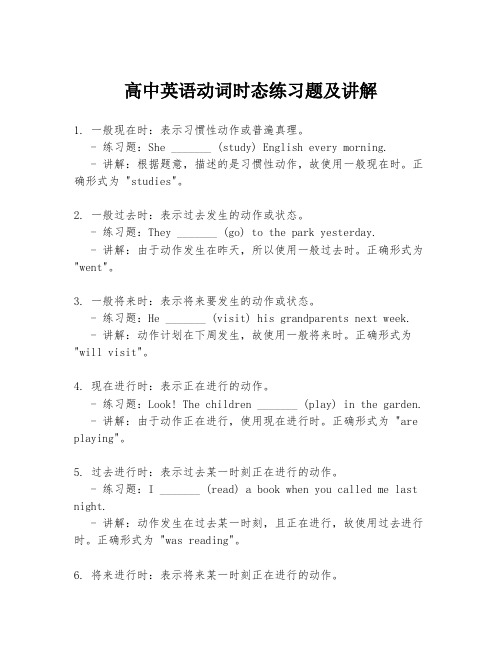
高中英语动词时态练习题及讲解1. 一般现在时:表示习惯性动作或普遍真理。
- 练习题:She _______ (study) English every morning.- 讲解:根据题意,描述的是习惯性动作,故使用一般现在时。
正确形式为 "studies"。
2. 一般过去时:表示过去发生的动作或状态。
- 练习题:They _______ (go) to the park yesterday.- 讲解:由于动作发生在昨天,所以使用一般过去时。
正确形式为"went"。
3. 一般将来时:表示将来要发生的动作或状态。
- 练习题:He _______ (visit) his grandparents next week. - 讲解:动作计划在下周发生,故使用一般将来时。
正确形式为"will visit"。
4. 现在进行时:表示正在进行的动作。
- 练习题:Look! The children _______ (play) in the garden. - 讲解:由于动作正在进行,使用现在进行时。
正确形式为 "are playing"。
5. 过去进行时:表示过去某一时刻正在进行的动作。
- 练习题:I _______ (read) a book when you called me last night.- 讲解:动作发生在过去某一时刻,且正在进行,故使用过去进行时。
正确形式为 "was reading"。
6. 将来进行时:表示将来某一时刻正在进行的动作。
- 练习题:She _______ (be) at a meeting at this time tomorrow.- 讲解:动作将在将来某一时刻进行,使用将来进行时。
正确形式为 "will be"。
7. 现在完成时:表示过去发生的动作对现在有影响或结果。
一般现在时与现在进行时讲解及练习
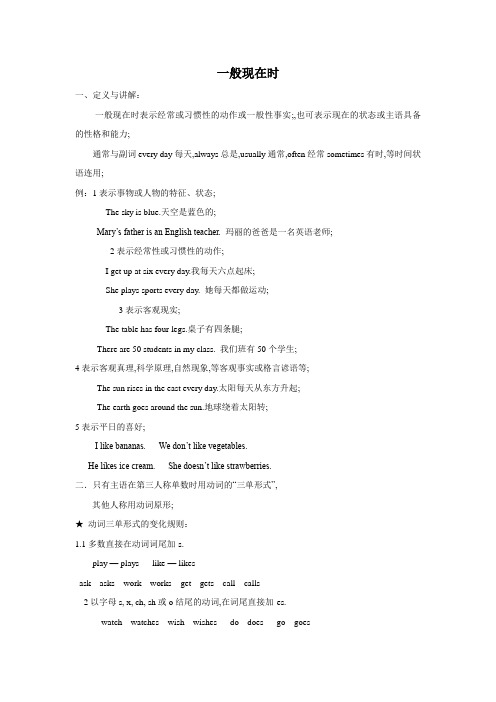
一般现在时一、定义与讲解:一般现在时表示经常或习惯性的动作或一般性事实;,也可表示现在的状态或主语具备的性格和能力;通常与副词every day每天,always总是,usually通常,often经常sometimes有时,等时间状语连用;例:1表示事物或人物的特征、状态;The sky is blue.天空是蓝色的;Mary’s father is an English teacher. 玛丽的爸爸是一名英语老师;2表示经常性或习惯性的动作;I get up at six every day.我每天六点起床;She plays sports every day. 她每天都做运动;3表示客观现实;The table has four legs.桌子有四条腿;There are 50 students in my class. 我们班有50个学生;4表示客观真理,科学原理,自然现象,等客观事实或格言谚语等;The sun rises in the east every day.太阳每天从东方升起;The earth goes around the sun.地球绕着太阳转;5表示平日的喜好;I like bananas. We don’t like vegetables.He likes ice cream. She doesn’t like strawberries.二.只有主语在第三人称单数时用动词的“三单形式”,其他人称用动词原形;★动词三单形式的变化规则:1.1多数直接在动词词尾加-s.play — plays like — likesask---asks work---works get---gets call---calls2以字母s, x, ch, sh或o结尾的动词,在词尾直接加-es.watch---watches wish---wishes do---does go---goes3以“辅音字母加- y”结尾的动词,要先变y为i再加-es.try---tries study---studies cry---cries fly---flies2.不规则变化:be---- is have----has三、一般现在时的句子转换:1变一般疑问句:当句子中有be动词或情态动词时,则把be动词或情态动词can,could等提到主语的前面,口诀:一调二变三问号;2变否定句:在be动词或情态动词后面直接加not变成否定句. be后not莫忘记例:①陈述句:She is my sister..疑问句→ Is she your sister Yes, I am./ No, I’m not.否定句→ She is not my si ster.②陈述句:I can play soccer.疑问句→ Can you play soccer Yes,Ican./ No, I can’t.否定句→ I can not /can’t play soccer.★注意:对一般疑问句的回答:一般用什么问就用什么来回答;但以下例外:Is this a pencil Yes , it is./ No, it isn’t.Is that your backpack Yes , it is./ No, it isn’t.Are these your parents Yes, they’re./ No, they aren’t.Are those Jim’s brothers Yes,they’re./ No, they aren’t.3当句子中没有be动词,也没有情态动词时,变一般疑问句时,在主语前加助动词do I, we, you,以及复数, does第三人称单数she,he,it等变成问句;4变否定句时,在主语后谓语动词前加助动词don’t, doesn’t变成否定句,切记:助动词后的动词则还原成动词原形;例:①陈述句:We get up起床at 7:00 every morning.疑问句→Do you get up at 7:00 every morning否定句→We don’t get up at 7:00 every morning.②陈述句:She has a brother.疑问句→ Does she have a brother否定句→ She doesn’t have a brother.※在一般现在时中,当主语是第三人称单数时,谓语动词要用第三人称单数形式,即常在动词原形后加-s或-es;但有些同学们对于哪些主语是第三人称单数还不十分清楚,现归纳总结如下:一、人称代词he, she, it是第三人称单数;如:He likes watching TV. 他喜欢看电视;She has lunch at twelve. 她十二点吃午餐;二、单个人名、地名或称呼作主语;是第三人称单数;如:①Han Mei likes salsd . 韩梅喜欢萨拉;②Beijing is in China. 北京在中国;③Uncle Wang often plays volleyball.. 王叔叔经常打排球;三、单数可数名词或"this / that / the+单数可数名词"作主语时,是第三人称单数;如:②This book is yours. 这本书是你的;③That car is red. ④The cat is Lucy's. 这只猫是露茜的;四、不定代词someone, somebody, nobody, everything, something等及指示代词this, that作主语时,是第三人称单数;①Everyone is here. 大家到齐了;②There is a watch on the table. 桌上有块手表;③This is a pen. 这是一支钢笔;④That is an eraser.五、不可数名词作主语时为第三人称单数;如:①The milk牛奶is in the glass. 牛奶在玻璃杯里;②The bread is very small. 那面包很小;六、当数字或字母作主语时,看作第三人称单数;如:①"6" is a lucky number. "6"是个吉利数字;②"I" is a letter. "I"是个字母;一、按照要求改写句子1.This is my pencil 变一般疑问句your pencil 2. These red socks are Kate’s . 变一般疑问句socks Kate’s3. Mary does not have any books . 变肯定句some books .4. She likes theblack bag very much . 变为否定句5. I like apples. 用she改写句子6. It’s an English dictionary . 对画线部分提问. 7. He has hamburger and apples for dinner . 变一般疑问句二、用Be动词填空;1. you Li Fen No, not .2. Mr. green very busy Yes , he .3..This book very interesting .4. What class you in5. You and I good friends .6. The basketball club fun .三.用所给动词的适当形式填空;1. Lin Tao like his ruler .2. Let’s have ice cream .3. Let’s play tennis4. He like English.5. Nice meet you6. I need some fruits.一般现在时用法专练:一、写出下列动词的第三人称单数形式;have like drink _____ go _____ stay ____ study___ _ teach_____make ______look ______have____ come_____ watch______ plant_____ fly _____ do_____ 二、用括号内动词的适当形式填空;1. He often ________have dinner at home.2. Daniel and Tommy _______be in Class One.3. We_______not watch TV on Monday.4. Nick ____ ___not go to the zoo on Sunday.5. ______ they ________like pears6. _______ your parents _______have eggs every day7. There ________be some water in the bottle.18. Mike _______like cooking.9. They _______have the same hobby.10. Liu Tao ______ _do not like PE.11. This boy often _______watch TV in the evening.五、改错划出错误的地方,将正确的写在横线上1. Is your brother speak English __________________2. Does he likes going fishing ________________3. He likes play games after class. _______________ __4. Mr. Wu teachs us English. _______________5. She don’t do her homework on Sundays. _____________一般现在时态句型转换1.This is a white key. 对画线部分进行提问2.B en’s bag is yellow and red . 对画线部分进行提问3.Her name is Gina. 对画线部分进行提问4.My phone number is 673-8220. 对画线部分进行提问5.The boy’s name is Jack. 对画线部分进行提问6.The picture is on the wall. 对画线部分进行提问7.Your baseball is under the chair. 对画线部分进行提问8.His book is on the desk. 对画线部分进行提问9.Some balls are in the dresser. 对画线部分进行提问10.My computer is on my desk. 对画线部分进行提问11.He is Johnny. 改为一般疑问句12.These are his parents. 改为一般疑问句13.This is my sister. 改为一般疑问句baseball is under the bed. 改为一般疑问句key is on the bed. 改为一般疑问句has a tennis racket. 改为一般疑问句have some baseball bats. 改为一般疑问句has many things to do today. 改为一般疑问句like hamburgers . 改为一般疑问句have a TV. 改为一般疑问句are Tina. 改为否定句are my brothers. 改为否定句books are on the bookcase. 改为否定句books are under the desk. 改为否定句has a computer game. 改为否定句have a big TV in our house. 改为否定句has some money in her pocket. 改为否定句likes ice cream. 改为否定句to meet you 写出答语35.Is that a dictionary 改为复数句____________________________________________36These are photos. 改为单数句he your cousin 作肯定回答Linda his sister 作否定回答this a Chinese book 作否定回答are dictionaries. 改为单数句the CD on the sofa 作肯定回答the chairs next to the table 作否定回答is my book 改为复数句子are on the sofa . 改为单数句子现在进行时现在进行时是由“助动词beam, is, are+动词-ing”构成,表示说话者“此刻”或现阶段的行为;二、现在进行时的基本结构1.肯定句:主语+beam, is, are+现在分词+…… 例如:I am speaking with him on the phone. 我正和他通电话;He is playing tennis. 他正在打网球; My parents are dancing. 我父母正在跳舞;2.否定句:主语+be not+现在分词+…… 例如:I'm not studying. 我没在学习; She is not reading now. 现在她不是在看书;They are not writing. 他们没在写;3.一般疑问句:Be动词+主语+现在分词+…… 例如:1— Is she still helping Li Ling她还在帮助李玲吗— Yes, she is. 是的;/No, she isn't. 不,她没在帮李玲;2— Are you listening to music 你正在听音乐吗— Yes, I am. 是的;/No, I'm not. 不,我没有听音乐;4.特殊疑问句:特殊疑问词+be动词+主语+现在分词+…… 例如:— What are you studying 你正在学什么— I'm studying English. 我在学英语;— What is Mike doing 迈克在做什么----He is watching the football match. 他在看足球比赛;三、现在分词的变化规则1.一般在动词末尾加ing,如:think-thinking go-going2.以不发音字母e结尾的动词,先去掉e,再加ing,如:come-coming make-making3.以重读闭音节结尾的动词,中间只有一个元音字母,词尾只有一个辅音字母,应双写末尾的辅音字母,再加ing, 如:put-putting run-running四、现在进行时的基本用法1.表示此时此刻说话者正在进行的动作;例如:The teacher is talking with his students. 这位老师正在同他的学生交谈;What are you doing now 你现在干什么呢2.表示现阶段正在进行的动作,但此刻并不一定在进行; 例如:We are doing an experiment this week. 我们这个星期正在做一个实验;但说话时并不一定在做实验;3.现在进行时有时可用来表示将来发生的动作,这一用法常用于go, come, leave, start 等短暂性动词,后面也常用表示较近的将来时间状语如tomorrow, tonight, this morning/Friday 等,表示安排或计划好的事情;例如:We are leaving for Shanghai tomorrow. 我们明天启程去上海;4.现在进行时表示说话时正发生的或者正进行的动作;常与时间状语now , at the moment 等连用;It is raining hard now . Don't hurry .I am writing a letter . Will you please turn down the radioWatch out 当心It's falling .Look The clouds are gathering .Look at this picture of a busy railway station . A train is standing at one of the platforms ready to leave . Some of thepassengers are looking out of the windows watching the late-comers who are hurrying along looking for empty seats .We are busy at the moment . I'm selling cigarettes . My father is selling some sweets .5.表示按计划、安排将要发生的动作;We are going to Rome next week . Mr Black is leaving for Shanghai in a few days .Are you doing anything special tonight6.用在时间和条件状语从句中表达将来正进行的动作;I'll telephone you tomorrow while I'm waiting .I'll think about it while you are writing the report .When you are talking with him , take care not to mention this .If you are standing at the corner when I pass , I'll give you a lift into town .五、现在进行时的练习题按要求改写句子The boy is playing basketball.否定句:____________________________一般疑问句:_________________________ 肯定回答:__________________________ 否定回答:__________________________ 对“is playing basketball”提问:__________________________对“ The boy”提问:__________________________They are singing in the classroom.否定句:____________________________ 一般疑问句:_________________________ 肯定回答:__________________________ 否定回答:__________________________ 对“are singing ”提问:__________________________对“ in the classroom”提问:__________________________,the window ,open, now.用现在进行时连词成句._____________________birds are singing in the tree.就划线部分提问________________________,who,the window, cleaning连词成句______________________7. The children are playing games near the house.就划线部分提问_______________is closing the door now.改成否定句______________________are doing your homework.用“I”作主语改写句子______________________,the tree, sing, now, under.用现在进行时连词成句._____________________Young Pioneers are helping the old woman.改成一般疑问句______________________II.单项选择1.我在照看孩子.AI am looking after the baby. BI'm look aftering the baby.CI look am aftering the baby. DI looking after the baby.'s making ______a kite.AI, me BMy, my CMy, me DHis, his the woman ______ yellow your teacherAin Bputting on Cwearing DhavingThe twins _____their mother do the housework.Aare wanting Bhelp Care helping Dare looking the birds doing They are singing in a tree.AWho BWhat CHow DWhere she ____somethingAeat Beating Ceatting Deats7.你在干什么AWhat is you doing BWhat are you doCWhat are you doing DWhat do you doare you listening_____A/Bfor Cat Dto9.我正在听他说话.AI listening to him.BI'm listening to him.CI'm listen to him.DI'm listening him.are ____their clothes.Amakeing Bputting Cput away Dputting on III.用现在进行时完成下列句子:do sing an English song.mend mend a car.fly a kite Yes ,_______.sit in the boatask questionsplay games now.man______________work near the house now.。
英语八种时态讲解及练习

现在进行时
作谓语的动词用来表示动作(情况) 发生时间的各种形式称为时态。
1.概念:表示现阶段或说话时正在 进行的动作及行为。 2.时间状语:Now, at this time, days, look. listen等时间状语做标志。 3.基本结构:主语+be +doing +其 他 4.否定形式:主语+be +not +doing+ 其他 5.一般疑问句:把be动词放于句首。
现在分词的变法有
1)、一般在动词词尾加上-ing ,E.g. jump 2)、以不发音字母e结尾的动词,先 去e,再加-ing. E.g have write 3)、.以重读闭音节末尾只有一个辅 音字母结尾的词,它前面是单个元 音字母时要先将词尾的辅音字母双 写,再加上-ing. E.g. sit put 其句式 变换都在be上做文章。
10. I will go there when I _____(have, will have, has) time tomorrow. 11. He won’t come to the party unless he _____(be, will be, am, is, are) invited. 12. I’ll wait here until my mother ____(come, comes, will come) back. 13. Please return the book to the library as soon as you ______(finish, finishes, will finish) reading it. 14. Once you _____(see, sees, will see) him, you will never forget him.
一般现在时-现在进行时和一般过去时和一般将来时态
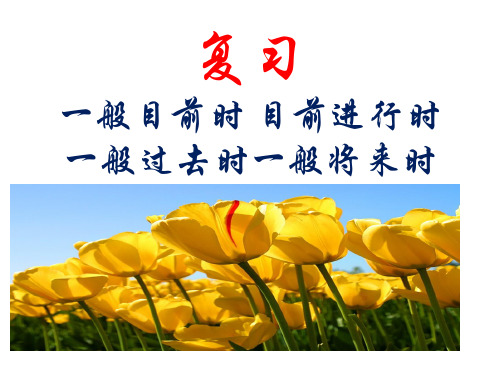
• Were you born in 1980?
第二种 具有行为动词旳
• 肯定构造 • 主语+行为动词(过去式)+其他 否定构造
主语+didn’t+行为动词(原形)+其 他 一般疑问句构造 Did+主语+行为动词(原形)+其 他?
动词旳过去式
• be动词旳过去式为was, were; • 行为动词旳过去式有规则变化和不规则变化两
afternoon. 今日下午我和爸爸打算去看京剧。 We are going to have a meeting today. 今日我们要 开会。 • I’m going to play the violin. 我打算拉小提琴。 • She’s going to play the piano. 她打算弹钢琴。
主语何时被看成第三人称单数:
• 1、人称代词 he she it • 2 、单个人名,地名或称呼 • 3、可数名词单数或 this/that/the+单个
可数名词 • 4、不定代词以及指示代词this that • 5、 不可数名词做主语 • 6、当数字或字母做主语时,也看作第
三人称单数.
主单三,谓单三
第二种 具有行为动词旳一般目前时态
• 其构造一般为,“主语+谓语+其他” • 这种情况又分两种,分为 • 1、主语不是第三人称单数旳情况。 • 2、主语是第三人称单数旳情况。
2.主语为非第三人称单数旳情况
肯定构造 主语+行为动词+其他 否定构造 主语+don’t+行为动词+其他 一般疑问句构造
Do+主语+行为动词+其他? They have lunch at 12:00. They don’t have lunch at 12:00. Do they have lunch at 12:00?
一般现在时和现在进行时的讲解
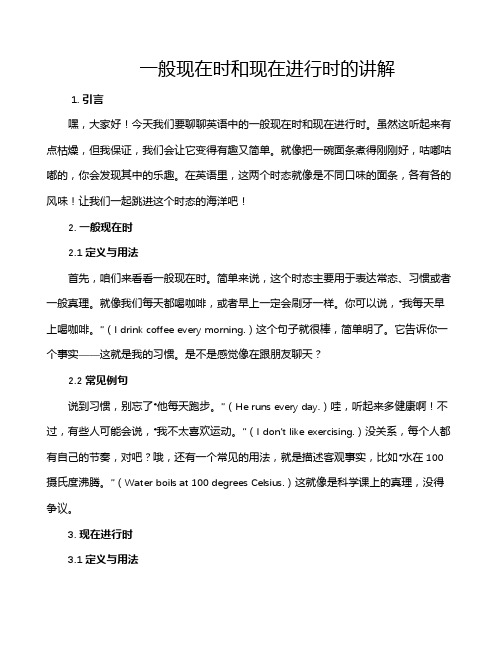
一般现在时和现在进行时的讲解1. 引言嘿,大家好!今天我们要聊聊英语中的一般现在时和现在进行时。
虽然这听起来有点枯燥,但我保证,我们会让它变得有趣又简单。
就像把一碗面条煮得刚刚好,咕嘟咕嘟的,你会发现其中的乐趣。
在英语里,这两个时态就像是不同口味的面条,各有各的风味!让我们一起跳进这个时态的海洋吧!2. 一般现在时2.1 定义与用法首先,咱们来看看一般现在时。
简单来说,这个时态主要用于表达常态、习惯或者一般真理。
就像我们每天都喝咖啡,或者早上一定会刷牙一样。
你可以说,“我每天早上喝咖啡。
”(I drink coffee every morning.)这个句子就很棒,简单明了。
它告诉你一个事实——这就是我的习惯。
是不是感觉像在跟朋友聊天?2.2 常见例句说到习惯,别忘了“他每天跑步。
”(He runs every day.)哇,听起来多健康啊!不过,有些人可能会说,“我不太喜欢运动。
”(I don’t like exercising.)没关系,每个人都有自己的节奏,对吧?哦,还有一个常见的用法,就是描述客观事实,比如“水在100摄氏度沸腾。
”(Water boils at 100 degrees Celsius.)这就像是科学课上的真理,没得争议。
3. 现在进行时3.1 定义与用法接下来,让我们转到现在进行时。
这个时态主要用于描述正在进行的动作,就像现在正在煮的面条,嘶嘶作响的!例如,“我正在看电视。
”(I am watching TV.)这个句子让人感觉很生动,就像你能看到我在沙发上懒洋洋的样子。
现在进行时让我们的对话充满了动态感,仿佛时间在此刻停止。
3.2 常见例句想象一下,一个阳光明媚的下午,你和朋友在一起。
你可以说,“我们正在聊关于旅行的事情。
”(We are talking about travel.)这时的你们似乎置身于一个快乐的泡泡中,讨论着未来的冒险。
又或者,“他正在做作业。
”(He is doing homework.)这就像一部悬疑剧,究竟他能不能按时完成呢?总之,正在发生的事情让我们感到兴奋和紧张。
现在进行时&一般现在时练习
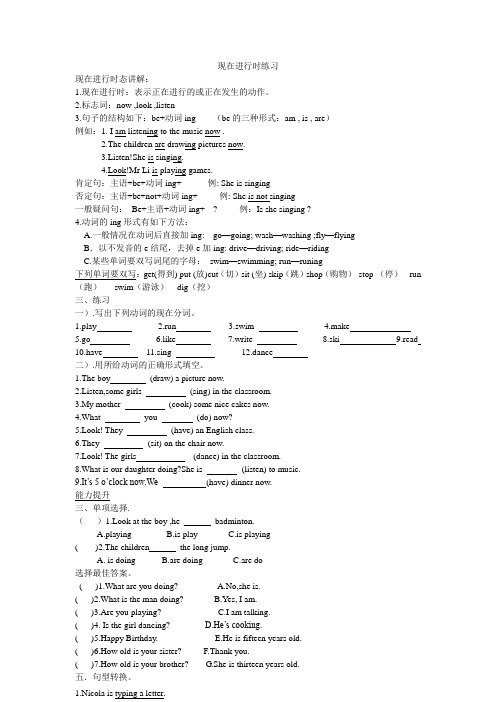
现在进行时练习现在进行时态讲解:1.现在进行时:表示正在进行的或正在发生的动作。
2.标志词:now ,look ,listen3.句子的结构如下:be+动词ing (be的三种形式:am , is , are)例如:1. I am listening to the music now .2.The children are drawing pictures now.3.Listen!She is singing.4.Look!Mr Li is playing games.肯定句:主语+be+动词ing+--- 例: She is singing否定句:主语+be+not+动词ing+--- 例: She is not singing一般疑问句:Be+主语+动词ing+---? 例:Is she singing ?4.动词的ing形式有如下方法:A.一般情况在动词后直接加ing: go—going; wash—washing ;fly—flyingB.以不发音的e结尾,去掉e加ing: drive—driving; ride—ridingC.某些单词要双写词尾的字母:swim—swimming; run—runing下列单词要双写:get(得到) put (放)cut(切)sit (坐) skip(跳)shop(购物)stop (停)run (跑)swim(游泳)dig(挖)三、练习一).写出下列动词的现在分词。
1.play2.run3.swim4.make5.go6.like7.write8.ski9.read 10.have 11.sing 12.dance二).用所给动词的正确形式填空。
1.The boy (draw) a picture now.2.Listen,some girls (sing) in the classroom.3.My mother (cook) some nice cakes now.4.What you (do) now?5.Look! They (have) an English class.6.They (sit) on the chair now.7.Look! The girls (dance) in the classroom.8.What is our daughter doing?She is (listen) to music.9.It’s 5 o’clock now.We (have) dinner now.能力提升三、单项选择.()1.Look at the boy ,he badminton.A.playingB.is playC.is playing( )2.The children the long jump.A. is doingB.are doingC.are do选择最佳答案。
初中一般现在时与现在进行时语法详解及习题
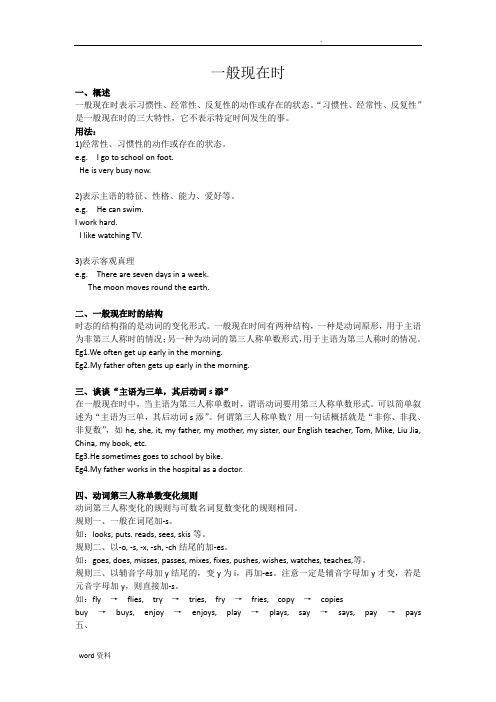
一般现在时一、概述一般现在时表示习惯性、经常性、反复性的动作或存在的状态。
“习惯性、经常性、反复性”是一般现在时的三大特性,它不表示特定时间发生的事。
用法:1)经常性、习惯性的动作或存在的状态。
e.g. I go to school on foot.He is very busy now.2)表示主语的特征、性格、能力、爱好等。
e.g. He can swim.I work hard.I like watching TV.3)表示客观真理e.g. There are seven days in a week.The moon moves round the earth.二、一般现在时的结构时态的结构指的是动词的变化形式。
一般现在时间有两种结构,一种是动词原形,用于主语为非第三人称时的情况;另一种为动词的第三人称单数形式,用于主语为第三人称时的情况。
Eg1.We often get up early in the morning.Eg2.My father often gets up early in the morning.三、谈谈“主语为三单,其后动词s添”在一般现在时中,当主语为第三人称单数时,谓语动词要用第三人称单数形式。
可以简单叙述为“主语为三单,其后动词s添”。
何谓第三人称单数?用一句话概括就是“非你、非我、非复数”,如he, she, it, my father, my mother, my sister, our English teacher, Tom, Mike, Liu Jia, China, my book, etc.Eg3.He sometimes goes to school by bike.Eg4.My father works in the hospital as a doctor.四、动词第三人称单数变化规则动词第三人称变化的规则与可数名词复数变化的规则相同。
规则一、一般在词尾加-s。
一般现在时和现在进行时时态练习及讲解

一般现在时和现在进行时时态练习及讲解(总7页)--本页仅作为文档封面,使用时请直接删除即可----内页可以根据需求调整合适字体及大小--小学英语一般现在时讲解及练习一.意义:表示经常发生的事情,动作或存在的状态二.二. 构成及变化三.动词的变化。
四.肯定句:主语+be(am,is,are)+其它。
如:I am a boy.我是一个男孩。
五.否定句:主语+ be + not +其它。
如:He is not a worker.他不是工人。
六.一般疑问句:Be +主语+其它。
如:-Are you a student -Yes. I am. / No, I'm not.七.特殊疑问句:疑问词+一般疑问句。
如:Where is my bike?八.2. 行为动词的变化。
九.l、当主语为第一,二人称及复数时,助动词为do十.肯定句:主语+动词原形(+其它)。
如:We often play basketball after school.十一.否定句:主语+ don't+动词原形(+其它)。
如:we don’t play basketball after school.十二.一般疑问句:Do +主语+动词原形+其它?十三.如: Do you often play basketball after school l Yes, we do. / No, we don't.十四.特殊疑问句:疑问词+以do开头的一般疑问句十五.如: What do you often do after school十六.2、当主语为第三人称单数时 ,十七.助动词为does十八.肯定句:主语+动词三单式(+其它)。
如: He swims well.十九.否定句:主语+ doesn’t+动词原形(+其它)。
如:He doesn’t swim well..二十.一般疑问句:Does +主语+动词原形+其它。
二十一.如:Does he swim well二十二.Yes, he does. / No, he doesn't.二十三.特殊疑问句:疑问词+以does开头的一般疑问句二十四.如: How does your father go to work二十五.三.第三人称单数的动词变化规则(只有在第三人称为主语的肯定句中,动词才用三单式)(1)多数动词直接加s:runs gets likes collets takes plays climbs…….(2)结尾是s, x, sh, ch, o,前为辅音字母,结尾加es :watches teaches goes does washes crosses mixes brushes(3)动词末尾y前为辅音:将y改为i加es: study→studies fly→fliescarry→carries cry→cries但在y前如果为元音则直接加s: buys says四.时间标志:always , usually , often , sometimes ,every…一般现在时练习题(1)I.用下列单词的适当形式填空often___________(play) in the playground._________(get) up at six o’clock. _________(brush) your teeth every morning(do) he usually________________(do) after school ________________(study) English, Chinese, maths, science and Art at school. sometimes __________(go) to the park with his sister. eight at night, she __________(watch) TV with his parents. Mike________(read) English every day many lessons_________yourclassmates________(have) on Monday time_________his mother_________(do)the houseworkII.句型转换 you often play football after school (改为肯定句)_______________________________________________________have many books.(改为否定句)_______________________________________________________Shan’s sister likes playing table tennis (改为否定句)_______________________________________________________ lives in a small town near New York.(改为一般疑问句)_______________________________________________________watch TV every day.(改为一般疑问句)_______________________________________________________ have four lessons.(改为否定句)_______________________________________________________doesn’t run fast (改为肯定句)_______________________________________________________dog runs fast.(改为否定句)_______________________________________________________ has two letters for him.一般疑问句:____________________________________________否定句: _______________________________________________usually play football on Friday afternoon.否定句: _______________________________________________一般疑问句: ___________________________________________划线提问:______________________________________________Yang usually washes some clothes on Saturday.否定句: _______________________________________________一般疑问句: ___________________________________________划线提问: _____________________________________________usually waters the flowers every day.否定句: _______________________________________________一般疑问句: ___________________________________________does his homework at home.否定句:_______________________________________________一般疑问句:___________________________________________一般现在时练习题(2)一、用所给动词的真确形式填空like ____________ (swim)._________(read) English every day._________(go)to school at seven in the morning.(go)to school at seven in the morning.mother________(like) ______(go) shopping.can ________(draw) many beautiful pictures.(make) a model plane.you ________(like)_________(run)he_________(like)_________(jump)Nancy_________(grow)flowers on Saturdayteachers________(like)___________(dance).teacher________(like)____________(dance).students___________(speak) English in class.student_________(speak) Chinese after class.15. Let’s____________and play football . (go)16. He_____________ like swimming . (not)17. I’m sorry ____________that . (hear)18. Wang Bing is____________ (write) an E-mail to his friend .19. He has_____________a headache . (get)20. _________you study English at school Yes , I___________. (do)21. __________your sister study English at school No , she__________ . (do)22. I’m _________ better . (feel)23. Why__________Tom absent today (be)二、用所给的人称改写句子 take photos on Sunday.(Mike)_______________________________________________________ grow beautiful flowers. (she)_______________________________________________________ likecollecting stamps. (Ben)_______________________________________________________ listen to music carefully. (myaunt)_______________________________________________________ like making amodel ship. (Helen)_______________________________________________________ clean the classroom every day.(he)_______________________________________________________ look after the pandas. (Mr Wang)_______________________________________________________ draw a tree and some flowers.(Nancy)_______________________________________________________ go to bed at eight. (my sister)_______________________________________________________ read newspapers in the evening. (Mr Green)_______________________________________________________小学现在进行时讲解及练习题1、概念:现在进行时表示说话时正在发生的事情或状态。
时态语态高中练习题及讲解

时态语态高中练习题及讲解### 时态语态高中练习题及讲解#### 练习题1. 一般现在时:请用一般现在时翻译下列句子。
- 他每天早晨跑步。
- 地球绕着太阳转。
2. 一般过去时:将下列句子转换为一般过去时。
- 我昨天去了图书馆。
- 他们去年在这个城市买了房子。
3. 一般将来时:使用一般将来时构造以下句子。
- 明天我会去看电影。
- 她下个月将会参加一个会议。
4. 现在进行时:根据给定的动词,构造现在进行时的句子。
- 她正在学习。
- 他们正在讨论。
5. 过去进行时:将下列句子转换为过去进行时。
- 昨天这个时候,我正在看电视。
- 昨晚,他们正在准备晚餐。
6. 现在完成时:使用现在完成时描述以下情况。
- 我已经完成了我的作业。
- 他们还没有到达。
7. 过去完成时:构造过去完成时的句子。
- 我到达的时候,电影已经开始了。
- 她告诉我她已经完成了她的报告。
8. 被动语态:将下列句子转换为被动语态。
- 他们正在建造一座新桥。
- 这本书是由著名作家写的。
9. 情态动词:使用情态动词表达可能性或能力。
- 他可能已经离开了。
- 她能够解决这个问题。
10. 条件句:构造条件句。
- 如果明天下雨,我们就不去野餐了。
- 要是我有时间,我会去参观博物馆。
#### 讲解1. 一般现在时:用来描述经常发生的动作或状态,以及普遍真理。
- He runs every morning.- The Earth revolves around the Sun.2. 一般过去时:用来描述过去发生的动作或状态。
- I went to the library yesterday.- They bought a house in this city last year.3. 一般将来时:用来描述将要发生的动作或状态。
- I will go to the movies tomorrow.- She will attend a meeting next month.4. 现在进行时:用来描述正在发生的动作。
一般现在时与现在进行时构成及练习
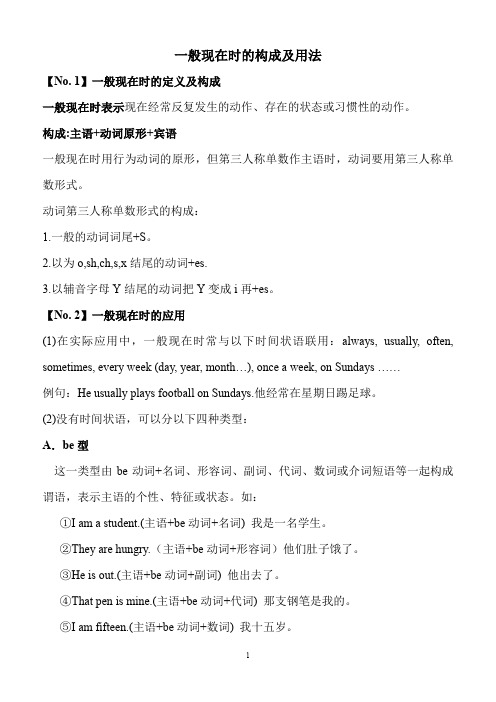
一般现在时的构成及用法【No. 1】一般现在时的定义及构成一般现在时表示现在经常反复发生的动作、存在的状态或习惯性的动作。
构成:主语+动词原形+宾语一般现在时用行为动词的原形,但第三人称单数作主语时,动词要用第三人称单数形式。
动词第三人称单数形式的构成:1.一般的动词词尾+S。
2.以为o,sh,ch,s,x结尾的动词+es.3.以辅音字母Y结尾的动词把Y变成i再+es。
【No. 2】一般现在时的应用(1)在实际应用中,一般现在时常与以下时间状语联用:always, usually, often, s ometimes, every week (day, year, month…), once a week, on Sundays ……例句:He usually plays football on Sundays.他经常在星期日踢足球。
(2)没有时间状语,可以分以下四种类型:A.be型这一类型由be动词+名词、形容词、副词、代词、数词或介词短语等一起构成谓语,表示主语的个性、特征或状态。
如:①I am a student.(主语+be动词+名词) 我是一名学生。
②They are hungry.(主语+be动词+形容词)他们肚子饿了。
③He is out.(主语+be动词+副词) 他出去了。
④That pen is mine.(主语+be动词+代词) 那支钢笔是我的。
⑤I am fifteen.(主语+be动词+数词) 我十五岁。
⑥The bike is under the tree.(主语+be动词+介词短语) 那辆自行车在树下。
B.do型do型由行为动词充当谓语,表示经常性或习惯性的动作,其构成为“主语+动词原形或动词第三人称单数形式”。
如:①I know it. 我知道这。
②He believes me. 他相信我。
C.there be型there be型句子表示“存在”,其构成为“there be+主语+其他”,表示客观事实。
一般现在时与现在进行时讲解及练习

1.be 动词的一般现在时的句式: 肯定句:主语+be+表语(n., adj.等)
e.g. He is a worker. You are thirteen. They are in the classroom. e.g. He is not a worker. You aren’t thirteen. They aren’t in the classroom.
B 5.He often _________ supper at 6:00 in the evening.
A. have B. has C. is having D. has got C 6. We _____________ any Chinese classes on Friday.
A. don’t has C. don’t have B. doesn’t have D. are have
B 1.I want____homework now. (A)doing (C)to do my (B)to do (D)do my
C 2.It's time______.
(A)go to school (C)to go home homeworks (B)play games (D)to do my
e.g. What is he? What color is that bird? How old are you? Where are they ?
特殊疑问句:疑问词+be+主语?
2.实义动词的一般现在时句式:
肯定句:主语(I/We/You/They)+实义动词+其他 e.g. I stay at home on Saturdays. They have sports every day. 主语(He/She/It)+实义动词三单现形式+其他 e.g. He stays at home on Saturdays. Lucy has sports every day. 否定句:主语(I/We/You/They)+do+ not+动词原形+其他 e.g. I don’t stay at home on Saturdays. They don’t have sports every day. 主语(He/She/It)+does +not+动词原形+其他 e.g. He doesn’t stay at home on Saturdays. Lucy doesn’t have sports every day. 一般疑问句:Do+主语(I/we/you/they)+动词原形+其他? e.g. Do you stay at home on Saturdays? Do they have sports every day? Does+主语(he/she/it)+动词原形+其他? e.g. Does he stay at home on Saturdays? Does Lucy have sports every day?
初中一般现在时和现在进行时讲解及练习题

初中一般现在时和现在进行时讲解及练习题现在进行时(一)现在进行时的构成肯定句:主语+be(am ,is, are)+Ving(现在分词)+其他成分主语 be Ving(现在分词)单数 I 第一人称复数 We单数 You 第二人称复数 YouHeShe单数第三人It 称其他单数Sam复数 they注:现在分词的构成变化方法动词原形 Ving(现在分词) 直接加ing play 以不发音的字母e结尾的单词,去掉字母e,再加ing take 结尾呈现“辅,元,辅”结构的动词,先双写末尾的stop 辅音字母,再加ing以ie结尾的动词,把ie改为y ,再加ing lie 否定句: + + + +I ________ __________ a student.(我不是学生。
一般疑问句: + + + , _________ _________ a student? 肯定回答:Yes, 主语+ be(am ,is, are) 否定回答:No,主语+ be(am ,is, are)+not. 特殊疑问句: 特殊疑问词+ be(am ,is, are)+主语+Ving(现在分词)+其他成分,(二)不用于现在进行时的动词:1)表示事实状态的动词,如have, belong, possess, cost, owe, exist, include, contain, matter, weigh, measure,continue等。
I have two brothers. 我有两兄弟。
This house belongs to my sister. 这房子是我姐的。
2)表示心理状态的动词,如know, realize, think see, believe, suppose, imagine, agree, recognize, remember, want,need, forget, prefer, mean, understand, love, hate等。
小学四种时态讲解及专项练习
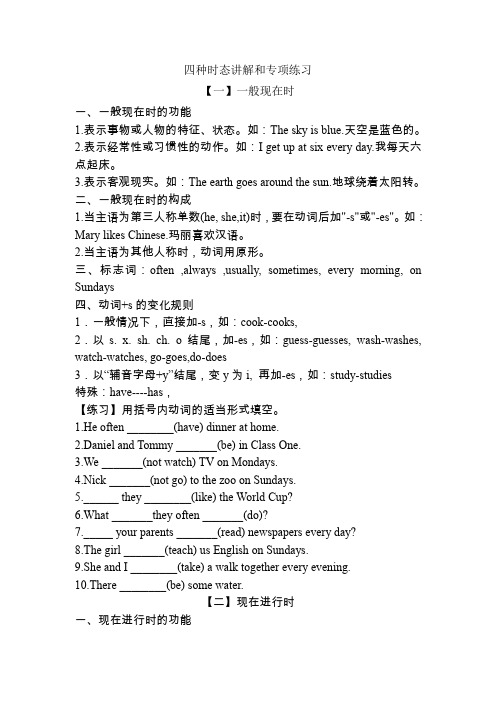
四种时态讲解和专项练习【一】一般现在时一、一般现在时的功能1.表示事物或人物的特征、状态。
如:The sky is blue.天空是蓝色的。
2.表示经常性或习惯性的动作。
如:I get up at six every day.我每天六点起床。
3.表示客观现实。
如:The earth goes around the sun.地球绕着太阳转。
二、一般现在时的构成1.当主语为第三人称单数(he, she,it)时,要在动词后加"-s"或"-es"。
如:Mary likes Chinese.玛丽喜欢汉语。
2.当主语为其他人称时,动词用原形。
三、标志词:often ,always ,usually, sometimes, every morning, on Sundays四、动词+s的变化规则1.一般情况下,直接加-s,如:cook-cooks,2.以s. x. sh. ch. o结尾,加-es,如:guess-guesses, wash-washes, watch-watches, go-goes,do-does3.以“辅音字母+y”结尾,变y为i, 再加-es,如:study-studies特殊:have----has,【练习】用括号内动词的适当形式填空。
1.He often ________(have) dinner at home.2.Daniel and Tommy _______(be) in Class One.3.We _______(not watch) TV on Mondays.4.Nick _______(not go) to the zoo on Sundays.5.______ they ________(like) the World Cup?6.What _______they often _______(do)?7._____ your parents _______(read) newspapers every day?8.The girl _______(teach) us English on Sundays.9.She and I ________(take) a walk together every evening.10.There ________(be) some water.【二】现在进行时一、现在进行时的功能现在进行时表示现在正在进行或发生的动作,也可表示当前一段时间内的活动或现阶段正在进行的动作。
时态(一般现在时与现在进行时)+课件-2023届高考英语复习+

2. 表示短期内或近段时间内经常进行的动作,但说话这一 刻不一定正在进行。
1、How are you getting along with your English these day. 2、We are going over the grammar learned before at present. 3、We are preparing for the meeting to be held next Friday now.
well是修饰speak的程度状语。 2.不定式在句子中可以作目的状语。 I come specially to see you.我专门来看你. 3.介词短语 Ten years ago, She began to live in Dalian.
4.从句作状语 When she was 12 years old, she began to live in Dalian. If I am பைடு நூலகம்ot busy tomorrow, I will play football with you.
B. took
C. takes
D. is taking
5. I’m sorry I can’t go. I __B__ a report.
4.Our teacher told us the earth goes round the sun.
4.在由连词if、unless 、before、 as soon as when、 once、 however 等引起的时间(条件、让步)状语从句,需用一般 现在时,表示将来。
1、I’ll call on you unless it rains the day after tomorrow. 2、Even if it rains tomorrow, the sports meet will take place. 3、We will start as soon as you are ready. 4、However much advice you give him, he will do exactly what he wants.
- 1、下载文档前请自行甄别文档内容的完整性,平台不提供额外的编辑、内容补充、找答案等附加服务。
- 2、"仅部分预览"的文档,不可在线预览部分如存在完整性等问题,可反馈申请退款(可完整预览的文档不适用该条件!)。
- 3、如文档侵犯您的权益,请联系客服反馈,我们会尽快为您处理(人工客服工作时间:9:00-18:30)。
小学英语一般现在时讲解及练习一.意义:表示经常发生的事情,动作或存在的状态二.二. 构成及变化三.动词的变化。
四.肯定句:主语+be(am,is,are)+其它。
如:I am a boy.我是一个男孩。
五.否定句:主语+ be + not +其它。
如:He is not a worker.他不是工人。
六.一般疑问句:Be +主语+其它。
如:-Are you a student -Yes. I am. / No, I'm not.七.特殊疑问句:疑问词+一般疑问句。
如:Where is my bike?八. 2. 行为动词的变化。
九.l、当主语为第一,二人称及复数时,助动词为do十.肯定句:主语+动词原形(+其它)。
如:We often play basketball after school.十一.否定句:主语+ don't+动词原形(+其它)。
如:we don’t play basketball after school.十二.一般疑问句:Do +主语+动词原形+其它?十三.如: Do you often play basketball after school l Yes, we do. / No, we don't.十四.特殊疑问句:疑问词+以do开头的一般疑问句?十五.如: What do you often do after school ?十六.2、当主语为第三人称单数时 ,十七.助动词为does十八.肯定句:主语+动词三单式(+其它)。
如: He swims well.十九.否定句:主语+ doesn’t+动词原形(+其它)。
如:He doesn’t swim well..二十.一般疑问句:Does +主语+动词原形+其它。
二十一.如:Does he swim well ?二十二.Yes, he does. / No, he doesn't.二十三.特殊疑问句:疑问词+以does开头的一般疑问句?二十四.如: How does your father go to work?二十五.三.第三人称单数的动词变化规则(只有在第三人称为主语的肯定句中,动词才用三单式)(1)多数动词直接加s:runs gets likes collets takes plays climbs……. (2)结尾是s, x, sh, ch, o,前为辅音字母,结尾加es :watches teaches goes does washes crosses mixes brushes(3)动词末尾y前为辅音:将y改为i加es: study→studies fly→flies carry→carries cry→cries但在y前如果为元音则直接加s: buys says四.时间标志:always , usually , often , sometimes ,every…一般现在时练习题(1)I.用下列单词的适当形式填空often___________(play) in the playground._________(get) up at si x o’clock._________(brush) your teeth every morning?(do) he usually________________(do) after school?________________(study) English, Chinese, maths, science and Art at school.sometimes __________(go) to the park with his sister.eight at night, she __________(watch) TV with his parents.Mike________(read) English every day?many lessons_________your classmates________(have) on Monday?time_________his mother_________(do) the housework?II.句型转换you often play football after school (改为肯定句)_______________________________________________________have many books.(改为否定句)_______________________________________________________Shan’s sister likes playing table tennis (改为否定句)_______________________________________________________ lives in a small town near New York.(改为一般疑问句)_______________________________________________________ watch TV every day.(改为一般疑问句)_______________________________________________________ have four lessons.(改为否定句)_______________________________________________________ doesn’t run fast (改为肯定句)_______________________________________________________ dog runs fast.(改为否定句)_______________________________________________________ has two letters for him.一般疑问句:____________________________________________ 否定句: _______________________________________________ usually play football on Friday afternoon.否定句: _______________________________________________ 一般疑问句: ___________________________________________ 划线提问:______________________________________________ Yang usually washes some clothes on Saturday.否定句: _______________________________________________ 一般疑问句: ___________________________________________ 划线提问: _____________________________________________ usually waters the flowers every day.否定句: _______________________________________________ 一般疑问句: ___________________________________________ does his homework at home.否定句: _______________________________________________ 一般疑问句: ___________________________________________一般现在时练习题(2)一、用所给动词的真确形式填空like ____________ (swim)._________(read) English every day._________(go)to school at seven in the morning.(go)to school at seven in the morning.mother________(like) ______(go) shopping.can ________(draw) many beautiful pictures.(make) a model plane.you ________(like)_________(run)?he_________(like)_________(jump) ?Nancy_________(grow)flowers on Saturday ?teachers________(like)___________(dance).teacher________(like)____________(dance).students___________(speak) English in class.student_________(speak) Chinese after class.15. Let’s____________and play football . (go)16. He_____________ like swimming . (not)17. I’m sorry ____________that . (hear)18. Wang Bing is____________ (write) an E-mail to his friend .19. He has_____________a headache . (get)20. _________you study English at school Yes , I___________. (do)21. __________your sister study English at school No , she__________ . (do)22. I’m _________ better . (feel)23. Why__________Tom absent today (be)二、用所给的人称改写句子take photos on Sunday. (Mike)_______________________________________________________ grow beautiful flowers. (she)_______________________________________________________ like collecting stamps. (Ben)_______________________________________________________ listen to music carefully. (my aunt)_______________________________________________________ like making a model ship. (Helen)_______________________________________________________ clean the classroom every day. (he)_______________________________________________________ look after the pandas. (Mr Wang)_______________________________________________________ draw a tree and some flowers. (Nancy)_______________________________________________________ go to bed at eight. (my sister)_______________________________________________________ read newspapers in the evening. (Mr Green)_______________________________________________________小学现在进行时讲解及练习题1、概念:现在进行时表示说话时正在发生的事情或状态。
